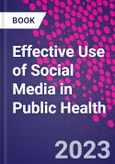Effective use of Social Media in Public Health offers a well-organized and comprehensive review of social media and its impact on people's lives and the public health sector. Divided into sections, the book addresses the growing use (and importance) of social media in conducting and disseminating research findings and covers an array of issues from cyberbullying to diversity and inclusion. Written by health educators and practitioners for health educators and practitioners, this book is a timely resource on the topics discussed.
Please Note: This is an On Demand product, delivery may take up to 11 working days after payment has been received.
Table of Contents
Foreword
Rick Petosa
Preface
Part I: Introduction
1. Social media and types with their current applications in public health and healthcare
Tung Sung Tseng and Gabrielle Gonzalez
2. Gender and age-specific use of social media
Jody L. Vogelzang
Part II: Social media use and mental health outcomes in diverse populations
3. Social media and young adults
Bronwyn MacFarlane and Jason Kushner
4. Social media: utility versus addiction
Ram Lakhan, Bidhu Sharma and Manoj Sharma
5. Social media use among older adults and their challenges
Ram Lakhan, Bidhu Sharma and Manoj Sharma
6. Social media, diversity, equity, and inclusion
Tiffiny R. Jones and Sely-Ann Headley Johnson
Part III: Social media and global exposure to research
7. Ethical, privacy, and confidentiality issues in the use and application of social media
Amar Kanekar and Joseph Otundo
8. Applications of social media research in quantitative and mixed methods research
Rose Marie Ward, Mai-Ly N. Steers, Akanksha Das, Shannon Speed and Rachel B. Geyer
9. Applications of social media in qualitative research in diverse public health areas
Geetanjali C. Achrekar and Kavita Batra
10. Role of social media in research publicity and visibility
Sely-Ann Headley Johnson and Tiffiny R. Jones
Part IV: Social media, public health communication, and pedagogy
11. Social media and policy campaigns
Gayle Walter
12. Social media and Infodemiologyduse of social media monitoring in emergency preparedness
Kavita Batra, Ravi Batra and Manoj Sharma
13. Social media, online learning, and its application in public health
Janea Snyder
Part V: Social media in healthcare
14. Application of social media in designing and implementing effective healthcare programs
Priyanka Saluja, Vishakha Grover, Suraj Arora, Kavita Batra and Jashanpreet Kaur
15. Role of social media in telemedicine
Rasika Manori Jayasinghe and Ruwan Duminda Jayasinghe
Part VI: Epilogue
16. Innovative uses of social media in public health and future applications
Manoj Sharma








